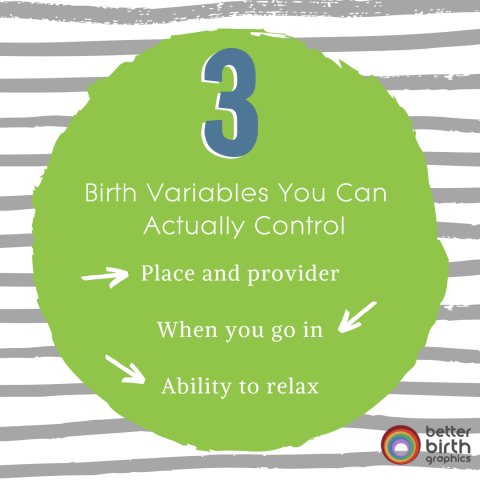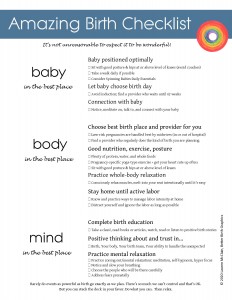
Having a baby is notoriously unpredictable.
- You don’t know when he or she is coming.
- You don’t know how long it will take.
- You don’t know how you or the baby will respond to labor.
- You don’t know when your water will break.
- You don’t know how long you’ll need to push.
- You don’t even know if the baby will come out your vagina or your belly.
Sometimes everything is set up perfectly in there and a baby will rocket right out before you can even leave home.
And sometimes you plan to stay home for the whole thing and end up in the operating room.
You live in a highly intellectual and technological society. Most of us are very bad at ‘letting things be’ and want to control as much as we can to affect outcomes to what we see as best. We’ve become very good at controlling the world around us–and in many ways that’s been good.
Compared to most people throughout most of the history of people, we’re able to lead lives of little discomfort and danger.
The process of birth can be controlled, too. We have plenty of technology and pharmacology that we use to steer the direction of labor or otherwise get what we want. There are still a lot of things we can’t control, and many that it’s probably better not to. But modern medical technology allows us to take much of the unknowing and mystery out of getting the baby out…
- You can schedule an induction or planned cesarean and pick the baby’s birthday.
- You can augment with Pitocin so it will go faster.
- You can have your water broken.
- You can use forceps or the vacuum to assist with pushing.
- You can have an epidural to control your response to the intensity of labor.
But there are still many things you can’t control, no matter how much medical assistance you have.
Birth is notoriously unpredictable because it’s part of life. And life is both a storm and a rainbow of variables.
No matter what kind of birth you’re planning: do your planning, make the decisions you can, prepare yourself with knowledge and a few skills, and then relax. Nothing as important and life-changing as birth is controllable. Do what you can, plan, and then go on the ride.
So what CAN you do to prepare for birth?
There are three main things that will affect the outcome of your birth more than anything else that you have control over. If you can set these three elements to your advantage, you’ll set yourself up for the best possible outcome, and you’re more likely to get the birth you want. Get a full checklist here.
The 3 Birth Things You Can Control
1. Birth Place and Provider
2. When You Go In
3. Your Ability to Relax
Let’s look at each of these in more detail…
Choose Birth Place & Provider Carefully
This is by far the biggest one. If you want a natural birth, go to someone who regularly does natural births–ideally a midwife because that’s her specialty. Go to a hospital or birth place where the way things are done best matches how you want them done. What are their procedures and rules and protocols? Find out what kind of births usually happen there. If you go to a hospital or a provider with a 33% cesarean rate and end up with a cesarean, it’s not just your rotten luck that you ended up with one.
For the vast majority of people, your choices come down to the following four:
- hospital w/ midwives
- hospital w/OBs
- birth center
- home
Home birth with an OB or unassisted home birth are options, but only a handful of people will be interested or able to plan that kind of birth.
Birth centers that are part of the hospital are hospital births. If a hospital birth center employs midwives who practice midwifery model of care, their procedures and protocols will be different than a birth center with midwives who operate essentially as extensions of the OBs.
The individual provider or provider group matters. Learn more about the difference between medical and midwifery model of care and why you should care which one your providers practices.
When Should You Go to the Birth Place
Sometimes we call leaving home for the birth place “the first intervention.” Your body, your hormones, and your mind are all affected by the momentous moment when you or someone says, “It’s time to go have a baby now.”
When you arrive at the birth place, there’s a psychological expectation of birth. The more time that passes before birth, the more opportunity your mind has to say “hey, what’s going on here? why is this taking so long? is something wrong? i’m tired. this is not what i expected.” This kind of thinking, when insistent, consistent–and especially early–messes with your hormones and the physiological process of normal birth. What can you do?
- Know and practice ways to manage intensity at home
- Distract and ignore the labor as long as possible
- Leave for the birth place when in active, heavy labor
Especially if you’re hoping for a drug-free or low-intervention birth, leaving home later is gold. Look, they can’t suggest interventions or drugs if you’re not there. And if you want to do it without those things, why are you going in anyway? What will change when you get there?
Unless there’s a reason they want to monitor you or baby more closely during labor, there’s no reason to go in much before the baby comes (besides avoiding having to do the most difficult contractions in the car-ha!).
If you arrive at the hospital with a head coming out of your body, the only thing they can do is catch.
Your Ability to Relax in Labor
Ugh. Relaxing. It’s the worst. What does it even mean? Nothing gets done when I’m relaxing. It might all fall apart. What a waste.
If that sounds familiar, you’re likely to experience more resistance to getting a small human out of your body. A person’s ability to relax their body (muscles) and their mind (control of hormones and perception), will greatly influence how they move through and experience birth.
Your mind and body talk to each other, and nowhere is that synergy more important than in something as big as birth.
You can absolutely stop or slow down your labor with your mind. Your body will protect you and the baby from being born if your mind says that the environment is unsafe. Some people are especially sensitive to this, and labor will slow with the wrong personality in the room.
Surrounding yourself with people who make you feel good and 100% support your birth choices sometimes means the difference between vaginal and cesarean birth. And it always means the difference in your comfort and experience.
Relaxing just means that you don’t hold muscle tension (or you don’t hold it for long), and that you make slower, lower, brainwaves (like zoning out). There are a number of things that can help with that:
- Practice ways of zoning out/getting to theta brainwaves–meditation, self-hypnosis, hyper body focus
- Notice and slow your breathing
- Choose the people who will be there carefully
- Address fears prenatally
- Positive thinking/affirmations
- Have someone to trust (choose: body, birth, God, provider, baby) so you can let go when you go into labor
p.s. A doula helps with a lot of these! 
Get a printable birth prep checklist
If you’re a birth worker, get this full birth prep checklist to share with your clients.

Birth is a big deal. Like most big deals, not everything is going to go exactly as you imagined or planned. Sometimes that turns out to be a good thing! If you have plans or hopes for this birth, there are some things you need to take control of before birth.
Use the above notes to asses where you’re at and make some changes or work on what you can. This is what you can do.




